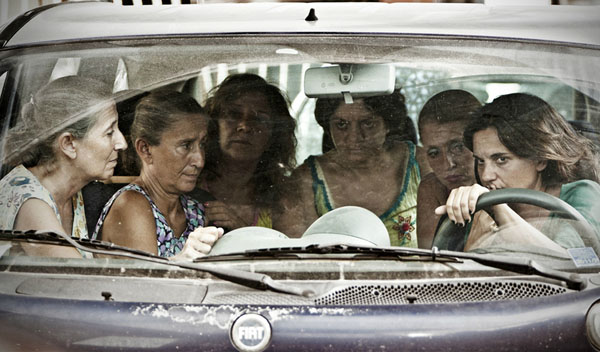“Two mule-headed women lock horns and car bumpers in multihyphenate Emma Dante’s vivisection of Sicilian society, A Street in Palermo,” writes Jay Weissberg in Variety. “Using a scalpel lightly coated with black humor, the tyro helmer with a background in theater/opera trains an agitated camera and a narrowly focused lens on two worlds: the privileged who flee Palermo’s suffocating alliances and disorder, and those who participate in the parochialism.”
Four out of five stars from John Bleasdale at CineVue: “Widower Samira (Elena Cotta) cleans the tomb of her daughter before going to pick up her son-in-law Saro (Renato Malfatti) and his family from the beach. Once seated, she drives them through the streets of Palermo towards home. Meanwhile, lesbian couple Rosa (Dante) and Clara (Alba Rohrwacher) search for a wedding reception only one of them wants to attend. The two cars meet head-to-head in the middle of a narrow street, and with neither of the stubborn women willing to reverse and let the other one pass, a showdown commences between the old and the new; traditionalism and liberalism.”
For Screen‘s Lee Marshall, “there’s no denying that one of the pleasures of A Street in Palermo (Via Castellana Bandiera) is the way it turns a supporting cast of swaggering Palermo males into impotent spectators of an all-female duel, which comes across as something a matriarchal Sergio Leone might have made if he had started channeling the spirit of Pirandello.”
No subtitles, but still
Actually, the Hollywood Reporter‘s Deborah Young suggests that this story “could more profitably have been written as an absurdist stage play; as a one-location film animated by incessant handheld camera work, its battle of wills quickly turns tedious.”
At Cineuropa, Camillo de Marco notes that the language of the characters “has a Sicilian crudeness and roughness to it,” that, evidently, subtitles are provided even for Italian audiences, and that “the use of dialect is also a barrier between the local community of via Castellana Bandiera and the others: outsiders. Many of the actors in the film belong to the Sud Costa Occidentale theater company, founded by Emma Dante in Palermo in 1999. ‘We try and make our Palermo discomfort profitable,’ Emma, whose theater evokes the city’s dreams, says. ‘This is why we cannot leave.'”
Venice 2013 Index. For news and tips throughout the day every day, follow @KeyframeDaily on Twitter and/or the RSS feed. Get Keyframe Daily in your inbox by signing in at fandor.com/daily.




